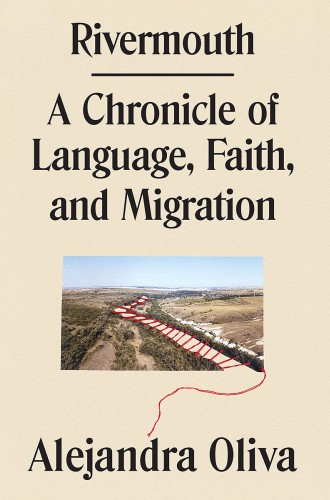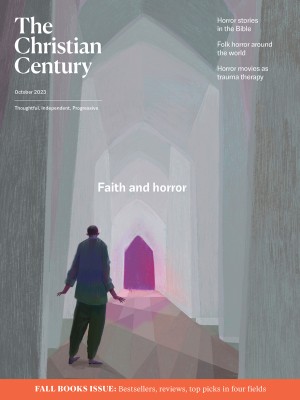Listening to—and translating—the voices of asylum seekers
In Alejandra Oliva’s new memoir, she describes how her body becomes an archive of migrants’ stories.
Each of us is a landscape, a geography. We cannot but be changed by what travels through us—the words, the stories, and the people we meet, even briefly, who shift the way we orient ourselves in the world. If we live across languages, we feel the way sounds journey through our bodies and change shapes, softening or expanding as we translate. If we experience trauma, first- or secondhand, its imprint might remain for years or even a lifetime inside us. We are marked by the world and our place in it.
In Rivermouth, a moving new memoir of translation by Alejandra Oliva (a century columnist), she describes how her body becomes an archive, collecting within it the stories she hears in her work as an interpreter for migrants seeking asylum in the United States. As they speak their stories to her in Spanish so that she might document them in English, she carries the weight of what these stories hold. The specific details of why people are forced to flee, their willingness to share them with Oliva, and her ability to render them into English all help to determine whether they will be allowed to remain in the United States in safety.
Read our latest issue or browse back issues.
As she listens, she is torn by the contradictions of bearing witness to suffering and still somehow remaining safe from it. “What do we do with this markedness?” she asks.
This question, of what we do with the things we cannot unknow and the stories we cannot unhear, is critical to Oliva’s timely meditation on identity, borderlands, the creativity and limits of translation, and the deepest causes of migration across the United States’ southern border, many of them rooted in the US government’s history of toxic policies in Central America. Structured in three parts, each organized by a central metaphor—a river, a table, and the border wall—the book charts the stages individuals must follow in the process of seeking asylum. Oliva brings us into the labyrinthine process that they must successfully navigate, a journey equally geographic and bureaucratic.
At the book’s center are the credible fear interviews, in which asylum seekers must convince an asylum officer that they have a credible fear that if they return to their country they will be kidnapped or killed. Oliva finds herself often preparing individuals for these interviews, a task that places the burden on asylum seekers to repeat their traumatized histories—and to frame the stories of their lives in the most frightening way possible. She describes her discomfort in learning that the more horrible a story is, the more likely it is that the teller might receive asylum.
It is her deep familiarity with these interviews that allows Oliva to ask the critical question at the heart of the book: Who deserves to live in safety? Why do the reasons for acceptance or denial of asylum sometimes seem so arbitrary? Slowly, readers realize that the US immigration system is designed to turn away thousands of people who have reasons for leaving that won’t be accepted through a credible fear interview, such as escaping drought, poverty, and the effects of climate change or seeking safety and education for their children. The system robs individuals of the chance to narrate the complex, nuanced, and dignified reasons they seek to migrate. Oliva’s sense that every single person for whom she translates has real reasons for leaving, and that the immigration system is often unwilling to hear them, is what makes this book so powerful and necessary.
Oliva’s story as a translator is rooted in her own complex history, which both allows for her encounters and leaves her questioning them. She writes of her own family story as a Mexican American who grew up crossing the border from the safe distance of an airplane, a member of a family of relative privilege that at times could find opportunity in both Mexico and in the United States. “It’s important,” she notes, “that my family’s story has wound across the river both ways, that the people I am descended from have stood on both banks of this river and wondered what promise might lie on the other side.” She knows that the border has been at times a wound, at other times a possibility.
She also knows that her personal story is different from those who she translates for—that her parents could choose to migrate instead of being forced to. Yet it is in the experience of growing up bilingual and “rivermouthed” that she finds herself able to work as a translator. Her writing is a journey to make sense of that fluid space, an ode to the kinship made possible in sharing a language. Her text becomes geography, and she keeps much of the dialogue of the book in Spanish, asking readers who are not Spanish speakers to be pulled into the disorientation of trying to navigate that space and find a home in it.
Rivermouth is also about faith. Oliva works as an interpreter while she attends Harvard Divinity School, and the question of how to reconcile God with injustice is threaded throughout the text. As a translator for those whose lives depend upon how well their story is understood and received, she recognizes the tension between the despair of Babel and the hope of Pentecost, between our inability to communicate and a moment in which humans might understand one another across languages. She admits her inability to name the unspeakable. “I don’t know how to tell even God about the things I’ve seen happen and how angry I am,” she writes. Yet translation also brings her to moments of faith, such as when she is asked to translate a prayer from English to Spanish at the border. She finds herself not just translating but praying the prayer.
Oliva’s book is very much focused on her own journey as a translator, and she does not claim to tell the stories of the people she interviews in great depth. In the book’s opening, she writes of her hope that her story and her book will not “speak over” other voices but rather “open the door to others like it.” In that vein, the book is an invitation to engage. We have recently seen the publication of Solito, Javier Zamora’s essential memoir of traveling as an unaccompanied minor (see review here); the Kino Border Initiative’s Voices of the Border, a collection of personal accounts from migrants crossing the US-Mexican border; and Karla Cornejo Villavicencio’s powerful The Undocumented Americans, in which she writes of her fellow undocumented Americans and their struggles in the United States. Oliva’s is one voice in a powerful and growing body of literature whose message could not be more urgent.
“I am to become invisible,” she writes about her role as a translator, “because then this asylum seeker is speaking directly to you, and you have no choice but to listen.”






